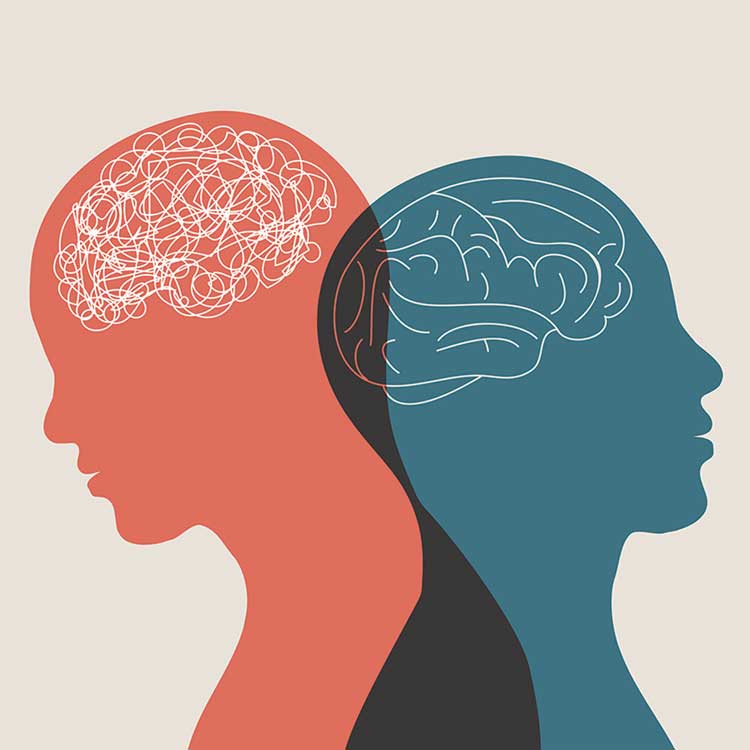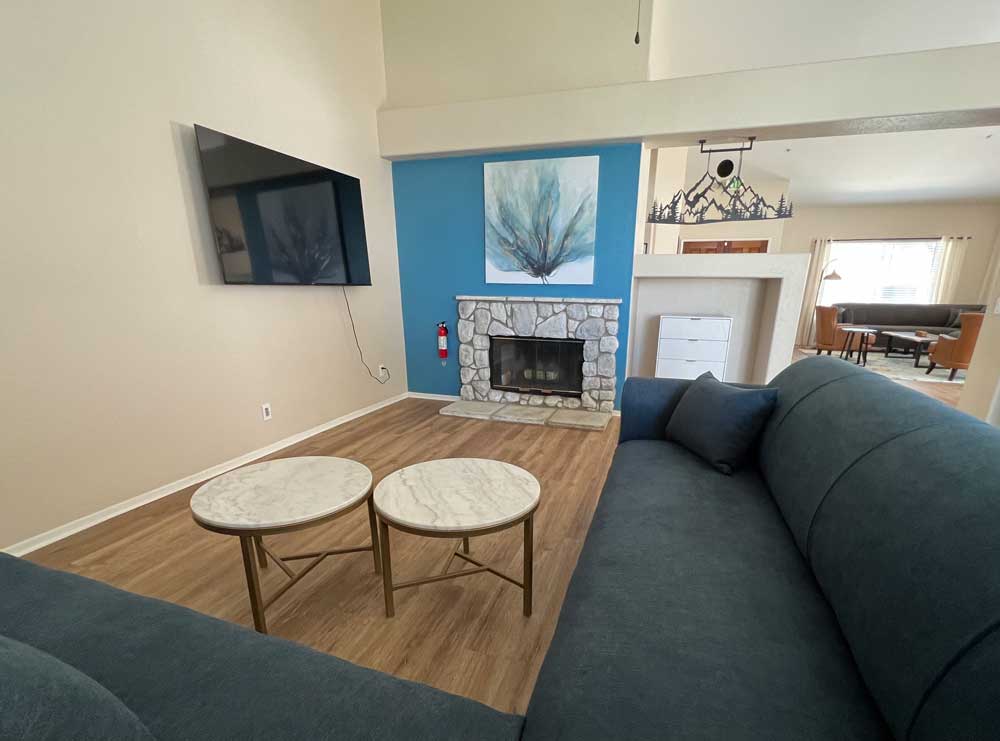Expert Dual Diagnosis Treatment Center for Co-Occurring Disorders, Rehab, Detox, and Mental Health Care in California
Integrated Treatment for Dual Diagnosis with Comprehensive Care for Co-Occurring Disorders

Dual Diagnosis Treatment Center in California: Mountain Sky Recovery
Welcome to Mountain Sky Recovery, one of the leading dual diagnosis treatment center in California. Our mission is to provide comprehensive, individualized care for individuals struggling with co-occurring mental health disorders and substance abuse. This page will guide you through the services we offer, our treatment approach, and why Mountain Sky Recovery is the right choice for your dual diagnosis treatment.
What is Dual Diagnosis?
Dual diagnosis, a term that has gained prominence since the 1990s, often refers to co-occurring disorders. This signifies the simultaneous presence of a substance use issue alongside a mental health disorder. The spectrum includes substance use disorders like alcohol, opioids, and amphetamines, as well as mental health challenges such as anxiety, depression, PTSD, bipolar disorders, and more.
The intricate relationship between substance use and mental health demands a comprehensive diagnosis by a licensed professional. It’s essential to distinguish between pre-existing mental health disorders and those induced by substance use, taking into account both genetic and environmental factors.
The Prevalence of Co-Occurring Disorders
Individuals with mental health conditions are at a heightened risk of developing substance use disorders. Data from SAMHSA’s 2021 National Survey on Drug Use and Health reveals that an estimated 9.2 million adults in the U.S. grapple with co-occurring disorders. Furthermore, according to the National Library of Medicine, “Adults with severe mental illness have extraordinarily high rates of co-occurring substance use disorders, typically around 50% or more, which adversely affect their current adjustment, course, and outcome.”
At Mountain Sky Recovery, we understand the intricacies of treating dual diagnosis and are unwavering in our commitment to guiding our patients toward enduring recovery.
The Imperative for Dual Diagnosis Treatment
Mental health disorders can profoundly influence an individual’s perception and management of addiction. Hence, concurrent treatment is paramount for lasting recovery.
- PTSD: As previously mentioned, conditions like PTSD can lead to a reliance on harmful substances, as individuals may use drugs or alcohol as a coping mechanism to deal with traumatic memories or triggers.
- Depression: Individuals with depression might use substances to self-medicate, seeking temporary relief from their symptoms. However, substance use can exacerbate depressive episodes, creating a vicious cycle.
- Anxiety Disorders: People with anxiety disorders might turn to substances to calm their nerves or manage panic attacks. Over time, this can lead to increased tolerance and dependence.
- Bipolar Disorder: Those with bipolar disorder might use substances during manic phases to enhance their euphoria or during depressive phases to alleviate their despair. Substance use can destabilize mood further and interfere with prescribed medications.
- ADHD: Individuals with Attention Deficit Hyperactivity Disorder (ADHD) might misuse stimulants, alcohol, or other drugs. This can lead to increased impulsivity and risk-taking behaviors.
- Borderline Personality Disorder (BPD): People with BPD might use substances to manage intense emotions or feelings of emptiness. Substance use can intensify emotional instability and impulsiveness associated with BPD.
Understanding the intricate relationship between specific mental health disorders and substance use is crucial for effective dual diagnosis treatment.

Your Beacon of Hope in the Journey of Dual Diagnosis Recovery

Personalized Dual Diagnosis Treatment
Recognizing the unique interplay between addiction and mental health for each patient is crucial. It’s not uncommon for substance use treatments to sideline the mental health component and vice versa. Overlooking either can impede the path to sustained sobriety.
Comprehensive Treatment Approaches
At Mountain Sky Recovery, we pride ourselves on our innovative BLENDED Recovery Modality. This approach is a testament to our commitment to providing our clients with the most effective and holistic treatment.
Our multidisciplinary team of experts collaborates closely with each client to craft a personalized treatment plan, considering their distinct needs and aspirations. The BLENDED Recovery Modality encompasses:
- 12 Steps: A structured step-by-step peer support approach that has been a cornerstone in addiction recovery for decades.
- CBT (Cognitive Behavioral Therapy): A therapeutic approach that helps clients identify and challenge negative thought patterns and behaviors.
- REBT (Rational Emotive Behavior Therapy): A form of therapy that teaches clients to challenge and change irrational beliefs.
- DBT (Dialectical Behavior Therapy): A therapy that focuses on mindfulness, emotional regulation, and interpersonal effectiveness.
- EMDR (Eye Movement Desensitization and Reprocessing):A psychotherapy technique designed to alleviate distress associated with traumatic memories. For individuals with dual diagnosis, EMDR can address trauma-related triggers and memories, reducing the urge to self-medicate with substances.
- Disease Model: Recognizing addiction as a chronic disease that affects the brain and behavior.
- Stages of Change: Understanding and leveraging the various stages an individual goes through in their recovery journey.
In addition to these evidence-based approaches, we integrate holistic practices to ensure a well-rounded and comprehensive recovery experience for our clients.
Embracing a Holistic Approach to Dual Diagnosis Treatment
At Mountain Sky Recovery, effective dual diagnosis treatment goes beyond addressing symptoms; it’s about healing the whole person. Our BLENDED Recovery Modality embodies this philosophy, intertwining evidence-based therapeutic approaches with holistic practices. This ensures that every facet of an individual’s well-being—physical, emotional, psychological, and spiritual—is nurtured and restored. By focusing on the complete individual and not just the disorders, we pave the way for a more profound and lasting recovery.

Understanding Dual Diagnosis
Dual diagnosis refers to the condition of having both a mental illness and a substance use disorder. These conditions often interact in ways that make diagnosis and treatment particularly complex. Effective dual diagnosis mental health and addiction treatment addresses both issues concurrently to improve the overall quality of life for the individual.
Treating only one aspect of dual diagnosis—whether it’s the mental health issues or the substance abuse—often leads to incomplete recovery and higher chances of relapse. Comprehensive dual diagnosis treatment ensures that both conditions are treated simultaneously, leading to more sustainable recovery outcomes.
Common Co-Occurring Disorders
Some of the most common co-occurring disorders include:
- Anxiety Disorders: Individuals with anxiety disorders often turn to substances as a way to cope with their symptoms.
- Depression: Substance abuse can exacerbate feelings of depression, creating a vicious cycle.
- Bipolar Disorder: This condition is characterized by extreme mood swings, and individuals may use drugs or alcohol to self-medicate.
- Borderline Personality Disorder: People with this disorder often struggle with impulsivity and unstable relationships, which can lead to substance abuse.
- Post-Traumatic Stress Disorder (PTSD): Trauma survivors frequently use substances to numb their emotional pain.
- Eating Disorders: There is a significant overlap between eating disorders and substance use disorders.
Understanding these common co-occurring disorders helps in tailoring the treatment plan to address all underlying issues effectively.
What Are Mental Disorders?
Mental health disorders encompass a wide range of mental health issues that affect mood, thinking, and behavior. These can include anxiety disorders, depression, bipolar disorder, schizophrenia, and personality disorders. Mental health disorders can significantly impair an individual’s ability to function in daily life, impacting their work, relationships, and overall well-being.
Common Mental Health Issues
Mental health issues are prevalent and can affect anyone, regardless of age, gender, or background. Anxiety disorders, such as generalized anxiety disorder, panic disorder, and social anxiety disorder, are among the most common. These disorders cause excessive fear or worry and can interfere with daily activities. Bipolar disorder is another significant mental health issue, characterized by extreme mood swings between mania and depression. Personality disorders, such as borderline personality disorder and narcissistic personality disorder, also fall under the umbrella of mental health disorders and can cause significant challenges in interpersonal relationships and self-image.
Co-Occurring Disorders
When an individual suffers from both a mental health disorder and substance abuse, it is known as co-occurring disorders or dual diagnosis substance abuse. This condition is complex and requires integrated treatment to address both issues simultaneously. Common co-occurring disorders include combinations of depression and drug addiction, anxiety disorders and alcohol abuse, and bipolar disorder and substance abuse.
The Impact of Co-Occurring Disorders
Co-occurring disorders can complicate treatment because the symptoms of mental health issues and substance abuse can overlap and exacerbate each other. For example, someone with a mental health disorder like bipolar disorder might use drugs or alcohol to self-medicate, leading to addiction. Conversely, substance abuse can worsen mental health symptoms, creating a vicious cycle that is challenging to break without professional help.
Dual Diagnosis Treatment
Call today to get personalized and comfrotable dual-diagnosis treatment in Murrieta, CA at Mountain Sky Recovery
The Role of Mental Health in Dual Diagnosis Treatment
Mental health is a critical component of dual diagnosis treatment. Addressing mental health issues is essential for achieving lasting recovery from substance abuse. Treatment strategies often include psychotherapy, medication management, and support groups. Cognitive-behavioral therapy (CBT) and dialectical behavior therapy (DBT) are common therapeutic approaches used to help individuals understand and manage their mental health disorders and substance abuse.
Specific Mental Illnesses in Dual Diagnosis Treatment
Anxiety Disorders

Anxiety disorders, including generalized anxiety disorder, panic disorder, and social anxiety disorder, are common in individuals with dual diagnosis substance abuse. Treatment for these disorders typically includes a combination of medication and therapy to help manage symptoms and reduce reliance on substances.
Bipolar Disorder

Bipolar disorder is characterized by extreme mood swings and is often linked to substance abuse as individuals may use drugs or alcohol to cope with their symptoms. Treatment for bipolar disorder within a dual diagnosis framework involves mood stabilizers, psychotherapy, and support groups to help individuals maintain stability and sobriety.
Personality Disorders

Personality disorders, such as borderline personality disorder, can complicate substance abuse treatment. Individuals with personality disorders may have difficulty maintaining relationships and managing emotions, which can lead to increased substance use. Dual diagnosis rehab provides specialized therapy to address these issues and promote healthier coping mechanisms.
Mountain Sky Recovery: Our Approach
Holistic and Integrated Treatment
At Mountain Sky Recovery, we believe in treating the whole person, not just the symptoms of their disorders. Our holistic approach includes a combination of medical, therapeutic, and holistic treatments designed to address the unique needs of each individual. This integrated treatment model ensures that both the mental health and substance use components of dual diagnosis are effectively managed.
Every individual’s journey to recovery is unique. Our addiction treatment plans are tailored to meet the specific needs of each client, considering their personal history, the severity of their conditions, and their recovery goals. By integrating personalized, evidence-based therapies that address both substance use disorders and co-occurring mental health challenges, we enhance the effectiveness of the treatment and support long-term recovery.
We utilize evidence-based practices in all our treatment programs. This means that our approaches are backed by scientific research and proven to be effective in treating dual diagnosis. Techniques such as Cognitive Behavioral Therapy (CBT), Dialectical Behavior Therapy (DBT), and Motivational Interviewing are central to our therapeutic interventions.
Personalized Treatment Plans
Every individual’s journey to recovery is unique. Our treatment plans are tailored to meet the specific needs of each client, considering their personal history, the severity of their conditions, and their recovery goals. This personalized approach enhances the effectiveness of the treatment and supports long-term recovery.
Evidence-Based Practices
We utilize evidence-based practices in all our treatment programs. This means that our approaches are backed by scientific research and proven to be effective in treating dual diagnosis. Techniques such as Cognitive Behavioral Therapy (CBT), Dialectical Behavior Therapy (DBT), and Motivational Interviewing are central to our therapeutic interventions.
Safe and Supportive Environment
Mountain Sky Recovery provides a safe and supportive environment where clients can focus on their recovery. Our facilities are designed to offer comfort and tranquility, which are essential for healing. The serene setting helps clients to disconnect from the stressors of everyday life and concentrate on their treatment.
Comprehensive Aftercare Planning
Recovery doesn’t end when treatment does. We provide comprehensive aftercare planning to ensure that clients have the support they need to maintain their recovery after leaving our facility. This includes continued therapy, support groups, and resources to help prevent relapse.
Services Offered at Mountain Sky Recovery
Comprehensive Assessment and Diagnosis
Our first step in treating dual diagnosis is conducting a thorough assessment. This includes a detailed evaluation of the individual’s mental disorders, substance use, and overall health. Accurate diagnosis is crucial for developing an effective treatment plan. As part of this process, we integrate addiction treatment programs that address both substance abuse and underlying mental health issues, ensuring a comprehensive approach to recovery.
Medical Detoxification
For individuals with severe substance abuse issues, we offer medically supervised detoxification. This process helps to safely manage withdrawal symptoms and prepare the individual for further treatment. Our medical team monitors clients around the clock to ensure their safety and comfort during this critical phase.
Individual Therapy
One-on-one therapy sessions are a cornerstone of our dual diagnosis treatment. These sessions help clients explore the underlying causes of their disorders, develop coping strategies, and work towards personal goals. Our therapists use a variety of techniques tailored to the client’s specific needs, such as CBT and DBT.
Group Therapy
Group therapy provides a supportive environment where clients can share their experiences, gain insights from others, and build a sense of community. This is particularly beneficial for addressing the social aspects of recovery. Group sessions often focus on topics like stress management, relapse prevention, and building healthy relationships.
Family Therapy
Family involvement is crucial in the recovery process. Our family therapy sessions help to heal relationships, improve communication, and build a supportive home environment. Families learn about the nature of dual diagnosis, how to support their loved one’s recovery, and how to address their own needs and concerns.
Medication Management
For clients with severe mental health disorders, medication may be an essential part of treatment. Our medical team carefully monitors and adjusts medications to ensure their effectiveness and manage side effects. Medication management is integrated into the overall treatment plan to support both mental health and substance use recovery.
Dual Diagnosis Programs
Our specialized dual diagnosis programs are designed to address the unique challenges faced by individuals with co-occurring disorders. These programs include a combination of therapy, education, and support services tailored to the needs of each client. Programs may include residential treatment, partial hospitalization, and intensive outpatient treatment depending on the individual’s needs.
Holistic Treatment Options
In addition to traditional therapies, we offer a range of holistic treatments such as yoga, meditation, and nutrition counseling. These treatments help to promote overall well-being and support recovery. Holistic treatments aim to balance the mind, body, and spirit, providing a comprehensive approach to healing.
Trauma-Focused Therapy
Many individuals with dual diagnosis have experienced trauma and suffer from mental illness, often using substances as a form of self-medication. Our trauma-focused therapy helps clients process and heal from traumatic experiences, which is essential for long-term recovery. Therapies such as Eye Movement Desensitization and Reprocessing (EMDR) and Trauma-Focused Cognitive Behavioral Therapy (TF-CBT) are used to address trauma-related issues.
Relapse Prevention
Preventing relapse in individuals with substance use disorder is a key focus of our dual diagnosis treatment programs. We teach clients strategies to recognize and manage triggers, develop healthy coping mechanisms, and build a strong support network. Relapse prevention groups and ongoing support help clients maintain their recovery in the long term.

Additional Resources
- Mental Health America: Learn more about mental health disorders and available resources.
- Substance Abuse and Mental Health Services Administration (SAMHSA): Find information on substance use and mental health treatment options.
- National Institute on Drug Abuse (NIDA): Get insights into the science of drug addiction and recovery.
Contact Us
If you or a loved one is struggling with dual diagnosis, don’t wait to seek help. Contact Mountain Sky Recovery today to learn more about our treatment programs and start your journey to recovery. Our compassionate and knowledgeable staff are here to answer your questions and guide you through the process of getting the help you need.
See Our Premier Facility!
FAQs About Dual Diagnosis Treatment
Q: What leads to dual diagnosis?
Q: How is dual diagnosis addressed?
Q: Who are the professionals involved in this treatment?
Q: How does dual diagnosis differ from comorbidity?
Q: What are the benefits of treating both conditions simultaneously?
Testimonials
“Mike was my counselor for about 6 months. I came to him broken, sick, and deep in the horrors of addiction. I had completely lost all hope. Mike was the first person to show me kindness and compassion in a long time.
I’ve never felt comfortable opening up to people before, but Mike was able to challenge my beliefs and give me the courage to overcome my fears and break down the walls I had built up over many years of addiction. He took the time to listen to me and allow me to express the issues I was dealing with.
His direct but non-judgmental manner made hard topics easier to address head-on, which I really needed and appreciated. I now have 4 years sober and a life that I never thought was possible and I truly believe I would not be here without the care, patience, and dedication I received from Mike.”
Rebecka
“Since early childhood, the truth was hidden from me. The truth about my family, the truth about the world, the truth about love, and the truth about myself. I’m not sure he knows this, but Mike is the first person who ever told me the truth.
When I wanted to leave, he gave me reasons to stay. When I started to doubt my abilities, he gave me reasons why I shouldn’t. Most importantly, when I started to judge and focus on others, he gave me a mirror. Those are a small fraction of all the examples of some of the truths he told me.
Every year when I take a chip, I break down and cry not only because I am proud to still be clean, but because I’m thankful I let Mike tell me the truth.
I will be grateful for him until the day I leave this Earth, and I imagine I’ll do it clean because Mike gave me the ability to imagine it”
Rebecka
Mike has an amazing ability to relate to his clients and use his own experiences to guide you through whatever obstacle life throws your way. I’ve never felt more supported from any previous counselors or therapists and I highly recommend giving Mike a chance to help you get your life back.
I really never thought I could be sober, or live a fulfilling life and it was Mike that believed in me and walked me through the challenges until I could stand on my own two feet. 4 and a half years later, and he still checks on me periodically and makes me feel supported.
I can’t say enough about how amazing my experience was working with Mike, he truly cares for his clients and has the biggest heart and passion for helping people.”
Julie
Why Choose Mountain Sky Recovery?

Individualized Care
Our compassionate staff works closely with clients to develop personalized treatment plans that address their unique needs and goals.
Proven Methods
We utilize evidence-based treatments and therapies to ensure the highest level of success for our clients.
Holistic Approach
We incorporate wellness practices and alternative therapies to promote healing in all aspects of our client's lives.
Supportive Community
Our nurturing environment fosters a sense of belonging and support, empowering clients to build lasting connections and recovery networks.














